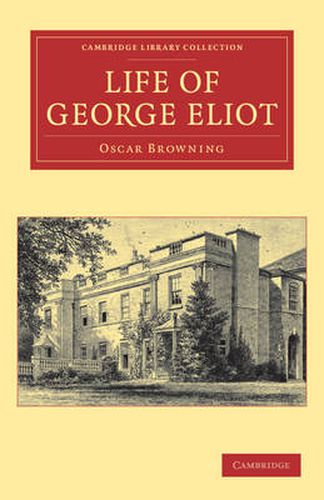Readings Newsletter
Become a Readings Member to make your shopping experience even easier.
Sign in or sign up for free!
You’re not far away from qualifying for FREE standard shipping within Australia
You’ve qualified for FREE standard shipping within Australia
The cart is loading…






‘George Eliot’ was the pseudonym of Marian Evans (1819-80), possibly the greatest of the Victorian novelists, whose works include The Mill on the Floss (1860), Middlemarch (1871-2) and Daniel Deronda (1876). Her personal life was complex - she was an independent woman who challenged social conventions. Her friend, Eton master and historian Oscar Browning (1837-1923), was moved to write this affectionate assessment of her life, and it was published in 1890, offering ‘no claims … but a friendship of fifteen years, and a deep and unswerving devotion to her mind and character’. Browning takes a chronological approach, focusing mainly on the beginnings of Eliot’s writing career and on her novels, while adding recollections of their encounters. He also writes with candour about Eliot’s relationship and cohabitation with the married writer G. H. Lewes (1817-78), which transgressed the social norms of the period.
$9.00 standard shipping within Australia
FREE standard shipping within Australia for orders over $100.00
Express & International shipping calculated at checkout
‘George Eliot’ was the pseudonym of Marian Evans (1819-80), possibly the greatest of the Victorian novelists, whose works include The Mill on the Floss (1860), Middlemarch (1871-2) and Daniel Deronda (1876). Her personal life was complex - she was an independent woman who challenged social conventions. Her friend, Eton master and historian Oscar Browning (1837-1923), was moved to write this affectionate assessment of her life, and it was published in 1890, offering ‘no claims … but a friendship of fifteen years, and a deep and unswerving devotion to her mind and character’. Browning takes a chronological approach, focusing mainly on the beginnings of Eliot’s writing career and on her novels, while adding recollections of their encounters. He also writes with candour about Eliot’s relationship and cohabitation with the married writer G. H. Lewes (1817-78), which transgressed the social norms of the period.